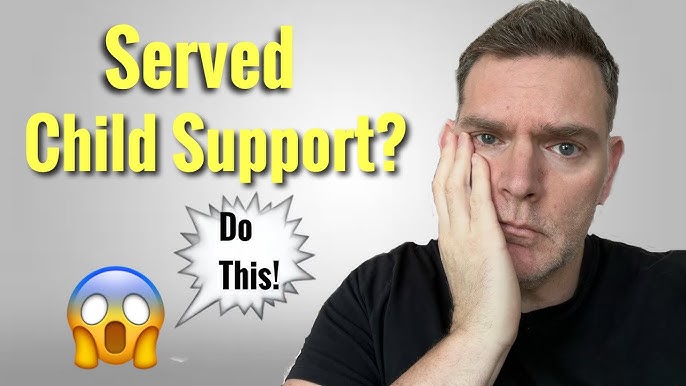Last Updated on January 15, 2025
Child support is not unconstitutional; it is a legal obligation for parents to financially support their child.
The History And Purpose Of Child Support Laws
Child support laws have a rich history and were established with the purpose of ensuring the financial well-being of children whose parents are no longer together. While some may argue that child support laws are unconstitutional, they remain an important legal framework for protecting the rights of children and providing them with necessary support.
The Establishment Of Child Support Laws
The history of child support laws dates back to the late 19th century when governments recognized the need to protect the welfare of children from non-custodial parents who were neglecting their financial responsibilities. Child support laws were established to ensure that both parents contribute to the upbringing of their children and to prevent custodial parents from bearing the financial burden alone.
The Purpose Of Child Support
The primary purpose of child support laws is to prioritize the best interests of the child. The financial support provided by the non-custodial parent helps cover the child’s basic needs, including food, clothing, and shelter. Additionally, child support aims to maintain the child’s standard of living and provide for their healthcare, education, and extracurricular activities. It ensures that children receive the necessary resources for their growth and development.
How Child Support Laws Vary By State
It is important to note that child support laws can vary from state to state within the United States. Each state has its own guidelines and formulas for calculating child support payments to account for the unique circumstances of the parents and the child. These variations take into consideration factors such as the income of the parents, the number of children involved, and the custody arrangement. By tailoring child support laws to the specific needs of each state, the legal system strives to ensure fairness and equity in determining child support obligations.

Credit: www.youtube.com
Arguments Against The Constitutionality Of Child Support
Child support, a legal obligation for parents to financially provide for their children, has been a topic of debate regarding its constitutionality. While child support laws aim to ensure the well-being and support of children, some argue that these laws infringe upon the constitutional rights of parents. This article examines the arguments against the constitutionality of child support and explores the impact of constitutional rights on child support payments.
Constitutional Rights And Their Impact On Child Support
When it comes to child support, one of the primary concerns raised is the potential violation of constitutional rights. Opponents argue that child support laws can conflict with various constitutional provisions, including:
- First Amendment rights: Some individuals argue that child support requirements can impede their freedom of speech or freedom of religion. They believe that being forced to financially support their children goes against their personal beliefs and values.
- Fourth Amendment rights: Critics claim that the collection and enforcement of child support involve invasive measures that violate their right to privacy, such as wage garnishments and asset seizures.
- Fifth Amendment rights: Those against child support argue that it can be considered a form of involuntary servitude, as it obligates parents to work and provide for their children regardless of their financial situation or personal choices.
- Fourteenth Amendment rights: Some contend that child support laws treat parents unequally, as they may disproportionately burden one parent over the other, particularly in cases where one parent has significantly lower income or financial resources.
Legal Challenges To Child Support Laws
In response to the perceived constitutional issues, legal challenges have arisen regarding the validity of child support laws. Various court cases have questioned the constitutionality of child support requirements, with arguments centered around:
- The violation of fundamental rights: Some argue that child support infringes upon fundamental rights guaranteed by the Constitution, such as the right to privacy, the right to free speech, and the right to equal protection under the law.
- The need for individualized assessments: Critics claim that child support guidelines often use a one-size-fits-all approach, failing to consider the unique circumstances of each family. They argue that individualized assessments should be made to determine appropriate support payments.
- The impact on non-custodial parent’s financial well-being: Opponents assert that child support orders can sometimes lead to financial instability for non-custodial parents, potentially hindering their ability to provide for themselves and meet their own needs.
The debate surrounding the constitutionality of child support is complex and controversial. Opponents argue that child support laws may infringe upon constitutional rights, while others believe that they are necessary to ensure the well-being of children. Legal challenges continue to shape the landscape of child support laws, with courts evaluating the balance between parental rights and the best interests of the child.
The Constitutionality Of Child Support: Legal Perspective
Child support is a legal obligation that ensures the financial well-being and welfare of children of divorced or separated parents. However, the constitutionality of child support has been a topic of debate and legal scrutiny. This article explores how the courts have addressed the constitutionality of child support from a legal perspective.
How The Courts Have Addressed The Constitutionality Of Child Support
The constitutionality of child support has been examined by various courts across the United States. While there is no explicit mention of child support in the Constitution, the courts have found it to be a valid exercise of government power to protect the best interests of the child.
One of the primary arguments raised against the constitutionality of child support is that it infringes upon the rights of the parents. However, courts have consistently held that the state has a compelling interest in ensuring that children receive adequate financial support from their parents.
Additionally, the courts have recognized that child support is a form of economic regulation, where the state acts in the best interests of the child to prevent them from becoming a burden on society. This approach has been upheld by several landmark Supreme Court cases.
Key Supreme Court Cases On The Issue
| Case | Ruling | Impact |
|---|---|---|
| Palisades Collection LLC v. Haarmann | The Supreme Court held that the state has the authority to enforce child support obligations even when the parents are in bankruptcy. | This ruling strengthened the enforcement powers of states in collecting child support payments. |
| Robinson v. Cahill | The Supreme Court ruled that the state has a legitimate interest in ensuring that child support orders are fair and reasonable | This case affirmed the state’s role in setting and enforcing child support guidelines to protect the best interests of the child. |
Balancing The Rights Of Parents And The Best Interests Of The Child
When it comes to child support, the courts strive to strike a balance between the rights of parents and the best interests of the child. While parents have certain rights, such as financial freedom and autonomy, the state has the authority to intervene when it is necessary to protect the child’s well-being.
The courts consider various factors when determining child support, including the financial resources of each parent, the child’s needs, and the standard of living the child would have enjoyed if the parents had stayed together. By weighing these factors, the courts aim to ensure that child support orders are fair, reasonable, and beneficial to the child.
The constitutionality of child support has been upheld through legal analysis and precedent set by various courts, including key Supreme Court cases. While the rights of parents are important, the state has a compelling interest in protecting the best interests of the child through the establishment and enforcement of child support obligations.
Frequently Asked Questions For Is Child Support Unconstitutional?
Is It Illegal To Not Pay Child Support In The Us?
Failure to pay child support as ordered by a court can be illegal in the US. Federal law makes it illegal for individuals to willfully disregard child support obligations. Offenders can face fines and imprisonment. For more information, refer to the Citizen’s Guide to Federal Law on Child Support Enforcement (Department of Justice).
What Does The 14th Amendment Say About Parental Rights?
The 14th Amendment does not explicitly mention parental rights. However, the Supreme Court has interpreted it to include the right of parents to make decisions concerning the care, custody, and control of their children.
Can You Say No To Child Support In Wisconsin?
In Wisconsin, you cannot say no to child support. It is a legal obligation of parents to financially support their child, and the court can order a parent to pay if they don’t agree on support. Wisconsin Child Support Laws.
Can Parents Agree To No Child Support In Texas?
In Texas, parents can agree to no child support, but only if the agreement is approved by a judge. It is important to seek guidance from experienced child support attorneys in Fort Worth to understand the process and the implications of forgoing child support.
Is Child Support Mandatory In The United States?
Child support is a legal obligation in the United States that parents are required to fulfill.
What Are The Consequences Of Not Paying Child Support?
Failure to pay child support as ordered by the court can result in fines, imprisonment, and other legal consequences.
Conclusion
Child support is a legal obligation for parents to financially support their child. While there may be debates surrounding its fairness, it is clear that child support serves an important purpose in ensuring the well-being of children. It provides financial support for their essential needs, including food, shelter, and education.
Furthermore, it helps to minimize the potential economic burden on custodial parents, allowing them to provide a stable and nurturing environment for their children. Ultimately, child support plays a crucial role in promoting the best interests of children and upholding their right to financial support from both parents.

